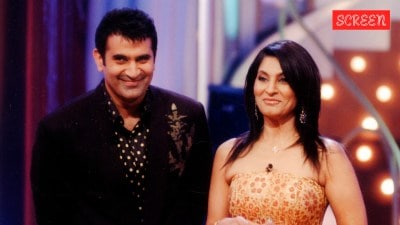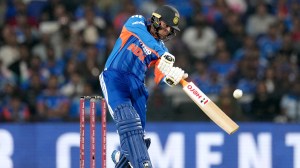That8217;s Life
Soha Ali Khan will be seen as an Indian born in Britain in Sangeeta Dattas Life Goes On. This English movie was screened in the international section at the Kolkata Film Festival and as part of a retrospective of her mother Sharmila Tagores films in the United Kingdom. Soha talks about her role in the movie and sharing screen space with her mother for the first time.
Soha Ali Khan will be seen as an Indian born in Britain in Sangeeta Dattas Life Goes On. This English movie was screened in the international section at the Kolkata Film Festival and as part of a retrospective of her mother Sharmila Tagores films in the United Kingdom. Soha talks about her role in the movie and sharing screen space with her mother for the first time.
As an actress working in Hindi films,what differences did you find between Hindi mainstream cinema and a British-Asian film?
Roles are not that different. I felt the difference in the language. It was liberating to work in an English film. The other difference was that I was allowed to be subtle in my performance. The work culture in UK was much disciplined in terms of hours of work,breaks,the atmosphere on sets and the absence of chaos! The film was set in a grand mansion on the outskirts of London,which was very peaceful. It was an enjoyable experience.
For the first time you have shared screen space with your mother. How was the experience?
She is more than just my mother,she is a legend. I had some initial jitters just thinking I had to work with her. It is awkward facing the camera with someone very close to you and when it is your own mother,who is an internationally renowned figure,you can imagine what can happen. She can be quite intimidating both as a mother and as an actress. She can read every expression of mine. The challenge was novel. For example,whenever there was a sad scene and there are many in this film I would just go into a dark corner inside my head and come back to give the shot no glycerine was needed.
Whats your role in Life Goes On?
I play Dia,who is the youngest of the three daughters of Sanjoy Girish Karnad and Manju Banerjee Sharmila Tagore. She lives with her parents. Her eldest sister is married to a British and has two kids. The second sister lives separately. Dia,a student of theatre,is the apple of her fathers eye much like Cordelia was for King Lear. But her mother passes away. In her absence,her rigid and arrogant father,who realises that he does not know his daughters well,confronts her about her choice of a life partner,a Muslim. The character of Dia is very close to me in real life. I have lived in England as a student and Im familiar with the countrys culture,along with the language,the accent and the lifestyle of Indians. I have a solid family background like Dia. I am very close to my parents. I have had my confrontations with them when I chose films as my career. On top of this,I had to play the daughter of my real mother. What can be closer to reality than that?
What kind of homework did you do for your role in Life Goes On?
The character of Dia in Life Goes On did not require any homework. It was more of getting in touch with unexplored emotions within me and being in the moment between action and cut. The schedule was very tight. I shot for long hours for 13-14 days. For the parts that show Dia rehearsing for and playing Cordelia for a stage performance of William Shakespeares King Lear,I needed to memorise my lines and do a quick workshop with Alison from the Royal Shakespeare Company. But it was fun because I love theatre.
What about the language used in the film?
It is a story of an affluent,cultured and successful Bengali family settled in London. I was familiar with the accent. It came naturally. Usually I face more trouble trying to get rid of my accent when I have to speak English in my Hindi films. Life Goes On is a movie with a lot of emotions. I felt Dia is an extension of myself so I just imagined how I would react if I was in her place. It was difficult.
How do you prepare for any role?
It differs from film to film and from character to character. For Khoya Khoya Chand,I had to put in months of training before shooting began. I had to train in Kathak,join Urdu language classes,listen to music and watch films made in the 1950s. I had to go through several look and styling tests. I like to know my lines thoroughly. I enjoy doing workshops with co-actors and depend on my directors inputs each day.
How would you define yourself as an actress?
I am a directors actress. I have learnt a lot from filmmakers like Sudhir Mishra and Rituparno Ghosh with whom I have worked. But I like to feel the character that I am enacting. I am a very good student when it comes to working under a director.
What are the factors that prompt you to sign a film?
I rely a lot on my gut feeling. I know immediately on hearing the story whether I want to do the film or not. The script and my role are most important. The price is significant too but not more than the director. No film can ever be bigger than the directors vision. A big banner and producer ensure that the right marketing provides a good opening and a proper release.
Which are your favourite films that you have acted in?
This one is easy though the reasons for my naming them are different. The films are Tum Mile,Khoya Khoya Chand,Antarmahal,Life Goes On,Rang De Basanti and Mumbai Meri Jaan.
- 01
- 02
- 03
- 04
- 05






























